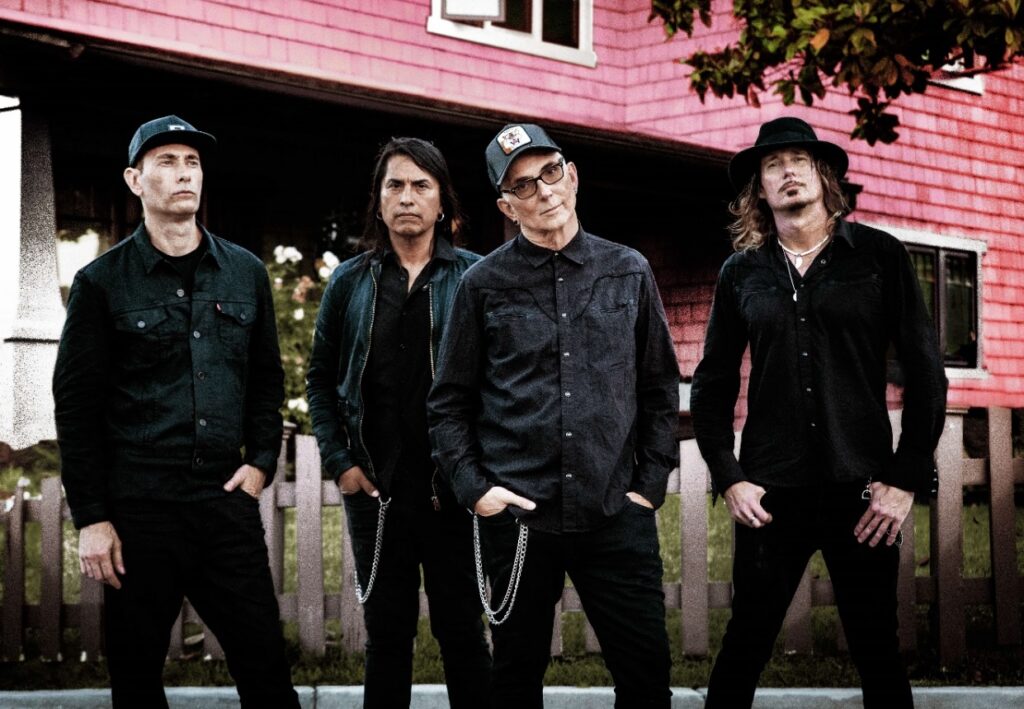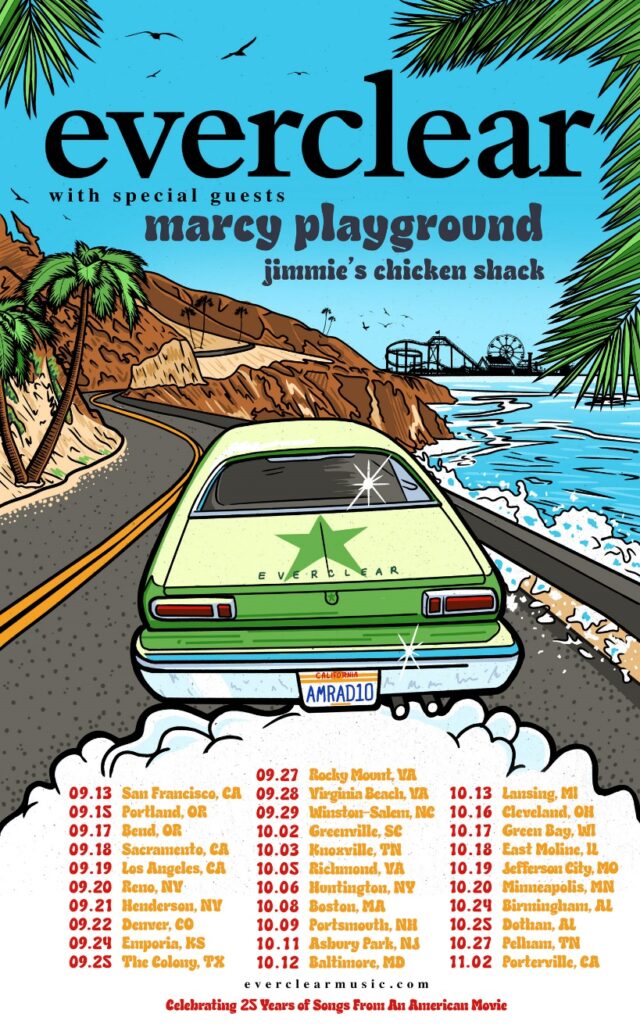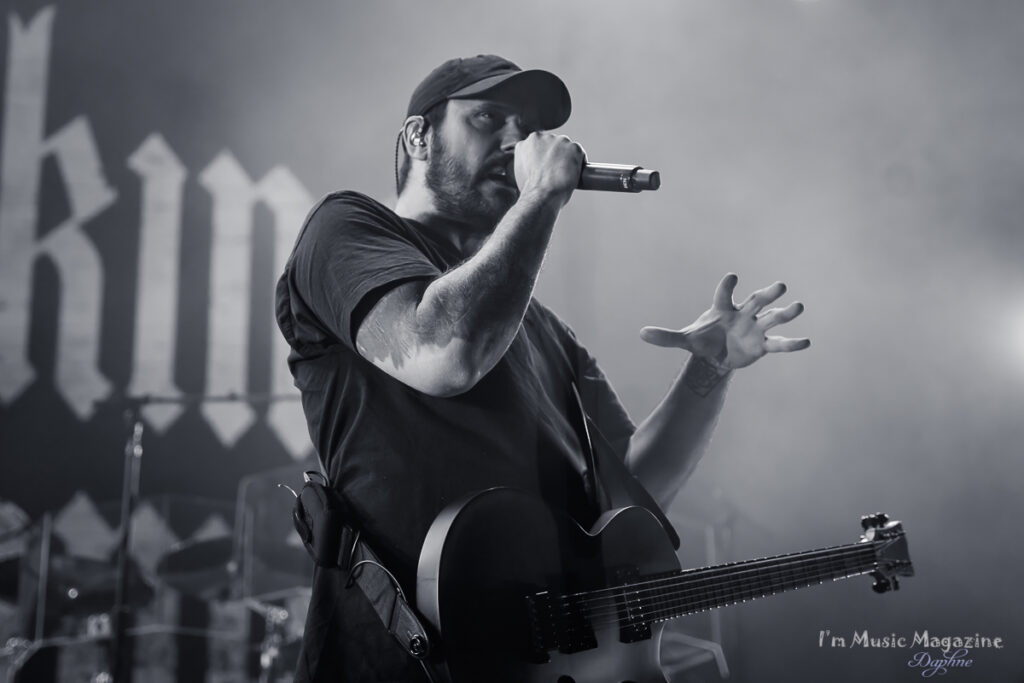
Everclear launched their fall headline tour last month hitting the road with special guests Marcy Playground and Jimmie’s Chicken Shack. The band, lead by vocalist, guitarist and founder Art Alexakis, continues to attract not only their older fans but a newer generation of fans who discovered the relatable lyrics of Everclear. In addition to the tour, the band has released Songs From An American Movie Vol. One on vinyl for the first time ever. “I am so stoked that after 25 years this album is finally on vinyl!” Shares Alexakis in the group’s press release. “When this record was originally released on Capitol, it was supposed to be released on vinyl but vinyl sales were down so much that the label absolutely refused to honor our contract.“ At the start of the tour, Art was kind enough to answer a few questions for I’m Music Magazine about the tour, the groups success, and more.
How’s it feel to be back on the road?
Art Alexakis/Everclear: We’ve actually done eight shows. Brother, I’m always on the road. I mean we’ve already done over 60 shows this year, about two to three a week, so we’re constantly out playing shows. The only difference is now I’m on a tour bus so you ask me how that feels, that’s awesome. I love being on the bus because it’s like having a home away from home you know, we have a base and we’re not constantly in airports.
What is it about being on the road that attracts you?
Art: Nothing. I’m 62 years old. I’ve been touring since I was 27 actually younger than that as a roadie. I I love playing shows. I love going to different cities and meeting people so that aspects is great. But actually being on tour, anyone who says that they enjoy doing that is lying. I mean, you know, I’d really rather be at home with my family and be able to Star Trek my way to shows every night. But actually being out on the road, there’s some aspects that are very familiar to me because I’ve been doing it for so long and I’ve done it so much. Being away from home is not fun for me, but playing the shows every night is the biggest buzz of my life, so there’s a trade-off for sure.
Well, how do you prepare yourself mentally to go out on the road?
Art: I don’t. I just do it. The band and I just do it.
What do you attribute to your continued success over the 30 plus years?
Art: That’s a good question. It depends on how you define success. We’re still playing. We’re playing to bigger crowds than we’ve played to in decades. So, yeah, I would I would characterize that as continuous success. To be honest with you, I would attribute it to just the classic sound of rock music, because what we all consider classic rock is pretty much late 60s, 70s, right, maybe early 80s as well. That’s what’s considered classic rock, and all the bands in the 90s, we all grew up in the 70s. That’s what we grew up with. We grew up with the Beatles, the Stones, the Doors, the… you know, Zeppelin, Aerosmith, Cheap Trick, and then hip-hop, and punk rock, and New Wave, and early alternative bands like R.E.M., and Replacements, and Jane’s Addiction, and I know they’re going through some weird stuff now, but great band, and very influential. Pixies and bands like that. So we’ve been able to take that through the funnel of all that classic rock stuff and through the funnel of, you know, the 80s and the early 90s and that’s what Nirvana was. That’s what alternative music in the 90s was. So I think that attributes a lot, because there’s, it’s just, it’s a classic American cultural phenomenon that keeps reinventing itself. You know what I mean?
As you are doing this tour, are you seeing younger faces in the crowd?
Art: That’s a phenomenal question. Absolutely. I mean, not just this tour, every tour, more and more since COVID. It’s really remarkable what happened during COVID. It’s a lot of people, a lot of young people, had to be on computers and screens, right? A lot of them, much to their detriment and against their will. But a lot of people went, did deep dives into music, trying to find something that was different than what is offered today. There’s no real rock, you know, there’s no real rock in commercial successful music right now, in pop music. A lot of people that I talk to, a lot of younger people, they’re telling me that they have gone down to the 90s and they just start looking through the bands and listening and finding the bands they like, and a lot of them have gone on to Everclear because they like the melodies, they like the guitars, and they like the lyrics. That’s what they’re told. But Tim, I’d say at least, minimum now, 25% of our crowd is younger people, and they weren’t even born when these songs were on the radio. They’re going into deep, deep tracks, and that makes me feel really good about the state of the Gen Z and the new ones coming up.
I think one thing, at least for me, your lyrics are still relatable today as they were 20, some 30 years ago. when you first released those songs?
Art: Well, thank you for saying that. I’d like to think that I work in universal themes that are, how should I say this, that are not dictated to by whatever is going on in the cultural spotlight at that time. Even in the 90s, I was doing, first person singer songwriter storytelling and most bands were not doing that, and I think it might’ve limited our success then, but I think it’s also had helped us continue the brand and because it is a universal thing.
One thing I read or saw in an interview that you had done a few years back and it was talking about before you signed with the major label Capitol back then, one of the conditions you wanted was control over the records, control over the producing of the records as an artist. How important is that for you?
Art: I think it depends on the artist. I think a lot of artists have had success just letting other people produce and other people do the artwork and all that stuff and it wasn’t just production; it was everything. It was total creative control, total control over the band, and yeah, the story, the real story was when we were in the middle of the bidding war. I sent out a memo, much to the chagrin of my manager at the time, who wasn’t the most reputable guy. Later I found that out not at the time. I just said, “Look, I want this much money, I want this many firm records, I want this much tour support, I want this to convert, I want full mechanicals, turn into full mechanicals if we hit a certain sales thing as far as publishing goes.” And everybody’s like, “Wow, this kid knows his business. Okay, that’s cool.” And then I signed an addendum and said, “Oh yeah, by the way, I want total creative control on everything to do with Everclear or me,” and I produced my own records, and I’d say two-thirds of the labels just disappeared, didn’t want any part of it. So I was left with about seven or eight, and I picked Capitol out of them.
Through the years with Everclear, what is one of the biggest highlights for you with the band?
Art: In which way? I mean there’s different ways of looking at it.
I would say more creativity, not so much the sales, but the creativity aspect.
Art: Oh well, I think just being able to make my own records and being able to dictate that and not having to do demos and still delivering platinum records or multi-platinum records, you know, three or four in a row. That feels pretty good. That feels like a career that someone can be proud of, and I am proud of it, you know, and I continue to do what I want to do be my own boss and the only bosses I really pay attention to are fans. But even at that, back in the day, I don’t write for people I don’t write for who I think our fans are or who I want them to be. I think real creative work comes from a selfish place of you’re trying to answer a question that you have, and you’re trying to do that in a way how you want to express yourself. So, I got time for one more.
When you were writing a song, how do you know that song is done?
Art: That’s a really good question. See, now you’re asking good questions. Really good questions. That right there, brother, is the million-dollar question. I taught songwriting for a long time. Both personally, like privately, and I was the chair of a small music college, Los Angeles College of Music in Pasadena, and helped co-write their curriculum there. You can teach someone how to craft a song. You can teach someone how to steal things from other people, borrow if you will, fashion if you will, you know, but it’s stealing. Everybody steals. But the ability to write melodies that connect with people, the ability to fashion words in a way that really connect with people, that really make an impact in a human way, and the ability to know when that’s done isn’t about the craft. That’s just something you either have or you don’t have, and you can’t teach that, and you can’t learn it. You either have it or you don’t. That’s my opinion.
Thank you, sir. Appreciate your time. Good luck on the tour.
Art: Have a wonderful day. Thanks for your time, bro.
Interview by I’m Music Magazine Writer Tim Board

Connect with Everclear online:
Website // Facebook // Instagram // Twitter // YouTube // Spotify // Apple Music






